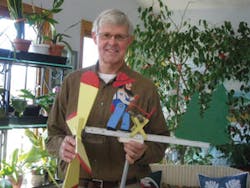When “Dr. Doom,” Larry Eils, retired as senior director of technical services from the National Automatic Merchandising Association (NAMA) in 2008, many were regretful. A friendly and entertaining speaker, everyone agreed Eils would be missed. Luckily, he agreed to stay on as a NAMA knowledge source partner and he still takes calls about the industry. But in his retirement, Eils is not loafing on the couch, watching TV, waiting for the phone to ring. With two rambunctious black labs to attend to, Eils and his wife, Marsha, are up at 6 a.m., and spend whatever time they can enjoying the outdoors.
20 YEARS AS A VENDING EDUCATOR
Having joined NAMA in 1985 after working as the Rock County, Wis. health officer, educating vending operators about food safety came naturally for Eils. During NAMA expos, he frequently reminded attendees there has never been a confirmed case of foodborne illness originating from a vending machine. What Eils never mentioned was how much of a role he played as director of health, safety and technical standards for the industry to make such a claim.
In his time with NAMA, Eils paid close attention to the federal food code and ensured that the requirements of the federal food labels were manageable for the vending industry. He explained the labels during industry conventions and answered numerous questions.
Eils also worked tirelessly to keep abreast of federal transportation rules, refrigerant recycling regulations, and numerous other rules. In the 1990s, he spearheaded NAMA’s plastic ring recycling for beverage six packs. Later, he oversaw the formation of the technical standards committee, a group of equipment and technology suppliers that developed uniform standards for electronic data in vending machines. Working with the industry software and machine manufacturers, both in the U.S. and Europe, to develop electronic data standards was one of Eils’ proudest accomplishments. “It has allowed the industry to improve their methods of operation to operate in today’s business environment,” he said.
FROM VENDING TO HOMESTEADING
On the outskirts of Harvard, Ill., which is known for its annual Harvard Milk Days celebration, the Eils’ house stands on six acres. Built in 1992 when they were living in Hoffman Estates near Chicago, both husband and wife always planned to retire in the country. “Looking for land to build on, we followed the train tracks,” said Eils. The train station is close to the house so Eils can get to downtown Chicago quickly.
The house’s 4-season porch allows the couple to continue one of their favorite pastimes year round — gardening. Shelves overflow with greenery around the windows, and beyond them is evidence of several flowerbeds back dropped by land filled with native prairie specimens.
“We both love plants,” said Eils. They have some large flower beds and are steadily increasing their vegetable garden. Last year, Eils built a gardening shed behind the peony flower bed. Some of the peonies, which were passed down from his wife’s grandmother, are more than 100 years old.
A CALLING FOR CLASSIC CARS
If not working in the yard, the couple might be cruising in their 1977 MGB, a classic British sports car Eils bought in 1987. As a member of the British Boots and Bonnets Car Cub out of Rockford, Ill., retirement allows him to attend the group’s meetings and events. In fact, this year he’s been elected events chairman, arranging monthly day drives and one long weekend for the 90 members of the club. In 2008, he overhauled the car’s engine, or helped anyway. “I’m a pseudo mechanic,” joked Eils. “I get the tools.”
Encouraged by a member of the car club, Eils also joined the Woodstock Wood Workers Club. In his modest workshop in the basement, he enjoys building and repairing whilygigs. These colorful garden sculptures use the power of the wind to turn a propeller that sets a whimsical scene in motion. During the summer, he displays his collection of whirlygigs on a section of the fence in the garden.
ACTIVE IN CHURCH OUTREACH
Eils has become more active in his St. Paul’s Episcopal Church. He’s the chair of the endowment committee and assists with a new program, “The Diaper Bank.” The Diaper Bank collects diapers from local churches to be distributed by local service agencies as needed.
“We were looking for an outreach program that a small church could do,” said Eils, “and this was a perfect fit.”
VENDING: NEVER FAR AWAY
Eils has been part of vending for so long he can’t help but continue looking at issues and helping industry members with questions. He believes the nutrition issue is still the biggest struggle for operators.
“Even in our local paper, we see vending is always mentioned…vending is still seen as the bad guy,” said Elis. He hopes NAMA’s increased presence in Washington, D.C. will influence legislation affecting vending. “Vending has its place and always will. It’s just hard to watch it being given a bad rap again,” said Eils.
He also attends the Illinois Automatic Merchandising Council meetings to keep up with what’s going on. He gets the occasional health department question and energy saving question, but it isn’t overwhelming. “I like to think there’s not too many calls because all the work we did in the past has paid off,” said Eils.
Eils is also planning to attend the Conference for Food Protection on behalf of NAMA, and he will be in the NAMA booth at the OneShow. He’s excited to see the newest technologies in person, especially the new machines.
When Eils sees a vending machine somewhere, he always stops to look at it. How is the product mix? Does he know the operator? It’s still in his mind.
His biggest disappointment is that he could never convince the agencies overseeing the Americans with Disabilities Act that vending machines are portable devices rather than permanent structures in buildings.
“We have had no complaints about the current heights since they were put in place over 30 years ago,” said Eils. Nevertheless, the agencies are still trying to get machine manufacturers to lower machine operating controls.
NO WISH TO TRAVEL
When asked why he hasn’t traveled since retiring, Eils shrugs and says he traveled so much for work that he’s content to stay home for now. Between state council meetings, conferences and events throughout the country for more than 20 years, Eils has been to many places, often accompanied by his wife. “I haven’t been on a long trip since I retired,” boasted Eils, “I’ve been on an airplane once.”
Instead of traveling, Larry, Marsha and the dogs, now only Willow and BJ since losing Mattie last year, keep busy with hobbies and await visits from their four grandchildren. Eils still has the “high” score in Nintendo Wii bowling since the grandkids’ last visit.
“In the beginning, retirement was an adjustment — all of a sudden being home all the time, after not being home a lot,” said Eils. But now he feels it gives him the opportunity to try new things, get more done around the house, and “raise plants from seeds.”
Eils has been so active that he’s actually lost 15 pounds since retiring, with no addition of formal exercise.
And he’s happy to give up his “Dr. Doom” days, a name he got from Ben Ginsberg, co-founder of Automatic Merchandiser, who also recently retired. Ginsberg noted Eils’ presentations never brought good news.
Eils misses his friends in the industry, but says when they retire, they’ll enjoy it immensely, too.





